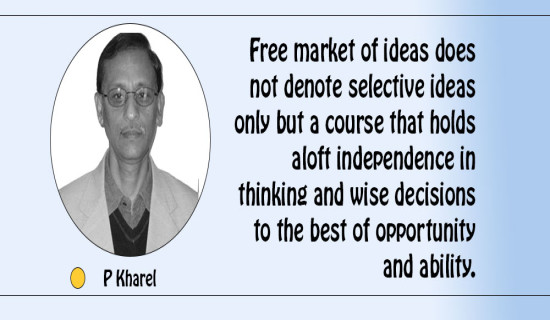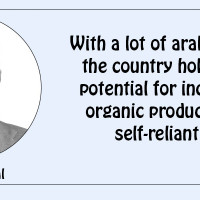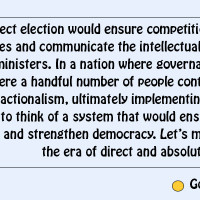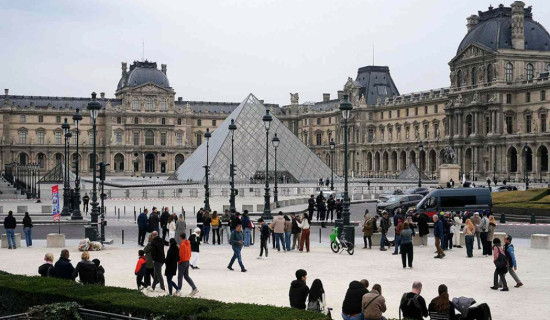- Monday, 20 October 2025
Choosing Suitable Mode Of Elections
Nepali Congress general secretary Gagan Kumar Thapa called for reform in the existing electoral system, the other day, arguing that this has been at the root of the festering political instability and fluidity in the country. Stating that the current electoral system by its very inherent propensity and character does not enable a political party to secure a majority of seats in the parliament to form the government, the NC leader contented that this has resulted into unprincipled hobnobbing among the disparate political groups for the sake of power. Thapa suggested that the country should revert back to the majoritarian electoral system to ensure that political parties can win mandate to rule on their own strength without relying on the support of the political forces that are ideologically estranged to each other.
A meaningful role
The NC leader’s objection on the mixed electoral system the country has adopted for the decade can be understood but it needs to be considered that the current mixed electoral system was adopted in the country following discussions to rectify the shortcomings and weaknesses of the first-past-the-post (FPTP) electoral system that was adopted following the democratic change of 1990s. As the FPTP typology of majoritarian electoral system gives domineering role to the political party that takes the majority of seats in the parliament thereby leaving no space for smaller political groups to perform a meaningful role. The political minorities are not allowed any space and ground as collaborators in the affairs of the state. As a winner-take-all method, it often produces disproportional results, particularly when electing members of a legislature, in the sense that political parties do not get representation according to their share of the popular vote.
This usually favours the largest party and parties with strong regional support to the detriment of smaller parties without a geographically concentrated base. Throughout the 20th century, many countries that previously used FPTP abandoned it in favour of other electoral systems, including the former British colonies of Ireland, Australia, and New Zealand. How justified it would be to roll back the mixed electoral system and adopt the FPTP that was discarded after serious deliberations citing several weaknesses inherent in it.
Likewise, Rastriya Prajatantra Party hit the streets the other day calling for the radical change in the existing mode of elections and governance. The party reiterated its long held position in favour of directly elected prime minister and restoration of the constitutional monarchy. The parties like CPN Maoist-Centre have also argued for direct elected presidency and the parliament elected through proportional representation. The party has not abandoned this position expressly though it is leading the present coalition government. The country thus lacks unanimity among the political actors and stakeholders on the mode of elections and governance.
The issue of direct elected presidency was debated in the 601-member Constituent Assembly elected to write the constitution. Finally, the parliamentary model was chosen for the purpose of forging compromise among the key political groups. The merit of direct elected presidency would vest in the president authority to choose the ministers at his or her own choice or discretion. As a result, the government would not have to depend on the vote of legislature to survive and function. Moreover, the kind of foul bargaining and the allegedly horse trading practices that are involved in the making of the ministers and other high level official appointments will not occur in the direct elected presidency.
In the presidential democracy, the executive arm is separate from a legislature. Like the president’s fixed term of office, the legislature, too, stays on for a fixed term of office and can never be dissolved or suspended before its tenure completes. A president, using a predetermined term, is likely to offer more stable leadership. In a presidential system, elections are fixed. These predetermined elections become a welcome “check” on the executive’s powers. In a presidential democracy, the president appoints experts to head various ministries, departments and portfolios, paying no regard to the appointees’ political affiliations. However, presidential democracy has several shortcomings as well. Presidential democracy has authoritarian bias and can cause authoritarianism to grow and seek to vindicate its role.
Moreover, the president and the legislature have similar mandates from the public. This means that conflicts between the executive and the legislative arms of government might prove hard to reconcile. The separation of powers of a presidential democracy sets apart the legislature. This separation is likely to create an unpleasant and long-lasting political gridlock whenever the legislative majority and the head of state come from various parties. In the US, such a situation has taken place several times.
Desired accountability
Additionally, these political stalemates minimise accountability by giving the legislature and the president a chance to play blame games. In these cases of political gridlock, presidential democracies fail to offer the desired accountability. It is easy for either the legislature or the president to escape mistakes by shifting blame to the other. It shows that the presidential democracy is not free from problems or constraints. Both parliamentary and presidential democracies have their own respective merits and demerits. No one is better than the other.
When we discuss to choose appropriate kind of electoral system and model of governance, it is important to weigh upon pros and cons of each model and take decisions. While it is important to choose appropriate institutions, it should be noted that the democratic institutions cannot work unless they are handled with the highest level of probity and sincerity. In Nepal, there are opinions that it is the democratic institutions and mode of elections but the actors and leaders who rule the country are responsible for the messy state of affairs.
(The author is presently associated with Policy Research Institute (PRI) as a senior research fellow. rijalmukti@gmail.com)
















